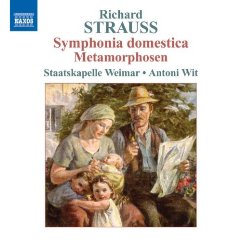Richard Strauss: Symphonia Domestica – Metamorphosen (Antoni Wit) [2009]
Richard Strauss: Symphonia Domestica – Metamorphosen (Antoni Wit) [2009]

1. Symphonia domestica, Op. 53, TrV 209: Bewegt 5:27 2. Symphonia domestica, Op. 53, TrV 209: Scherzo 6:43 3. Symphonia domestica, Op. 53, TrV 209: Wiegenlied 6:04 4. Symphonia domestica, Op. 53, TrV 209: Adagio 13:20 5. Symphonia domestica, Op. 53, TrV 209: Finale 15:12 6. Metamorphosen, TrV 290 Weimar Staatskapelle 28:18 Weimar Staatskapelle Antoni Wit - conductor
Antoni Wit is a much under-rated conductor and the Weimar Staatskapelle an overlooked orchestra, for all its historical connection with Richard Strauss who was its assistant conductor early in his professional life. The performance here of what many consider to be Strauss's schmaltziest (but wonderful!) composition, Symphonia Domestica, is really quite good. They treat the sentimentality of the score with warmth and tenderness, avoiding any maudlin feelings that might arise. They bring out the tartness of Strauss's delineation of his wife, soprano Pauline de Ahana, a true-to-life portrait of this formidable woman. And there is humor aplenty. Still, my preferred versions of this gargantuan tone-poem are those of Rudolf Kempe and the Staatskapelle Dresden, available now, I believe, only in a large box set, and the surprisingly good version by Gerard Schwarz and the Seattle Symphony Richard Strauss: Josephslegende Suite/Symphonia Domestica, the latter available here currently at a pittance and coupled with the underestimated Josephslegende.
For me, there is one reading of Metamorphosen that stands above the rest. That is by Herbert von Karajan and the Berliner Philharmoniker Strauss: Four Last Songs / Karajan, Berlin Philharmonic Orchestra which also includes Tod und Verklärung in a searing performance and Gundula Janowitz singing the Four Last Songs, all at mid-price. The Weimar Staatskapelle Metamorphosen is adequate but not incandescent, which is precisely what this late work of Strauss needs. ---Scott Morrison, amazon.com
With the bulk of his well-known and increasingly more sophisticated tone poems already under his belt, Strauss returned to the form he is largely credited with inventing in 1902 for his Symphonia Domestica. Were it not so cleverly and beautifully written, the subject matter may seem trite; Symphonia Domestica quite literally describes domestic life in the Strauss household. Already a master of extramusical associations, it is quite easy to follow along with the "characters" in Strauss' writing as they navigate through their affairs. Contrasting with the generally light, jocular mood of Sinfonia Domestica is the much later (1946) Metamorphosen. Scored for 23 solo string instruments, the lamenting work centers around the crumbling of German life Strauss perceived in the wake of World War II. Performing these two works is the Staatskapelle Weimar under the direction of Antoni Wit. Staatskapelle Weimar boasts the distinction of not only being one of the world's oldest orchestras, but also having performed the premiere of three of Strauss' tone poems. Its 2009 Naxos release finds the orchestra living up to its reputation. Both Sinfonia and Metamorphosen are performed with the utmost attention to detail and with a keen ear for technical precision. Wit especially captures the humor and character in Sinfonia, guiding listeners along through a believable and entertaining musical depiction of the Strauss family. The only possible downside to be found here is in the orchestra's balance, which seems to unduly favor the bass end of the orchestra, sometimes obscuring the upper strings and winds. --- Mike D. Brownell, Rovi
download: uploaded yandex 4shared mediafire solidfiles mega zalivalka filecloudio anonfiles oboom
Last Updated (Friday, 16 May 2014 13:40)








